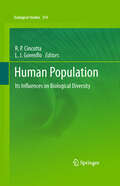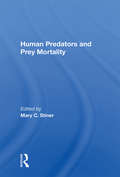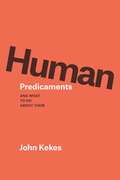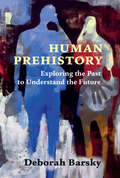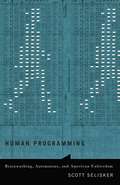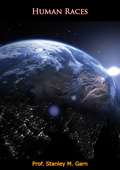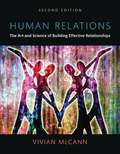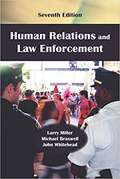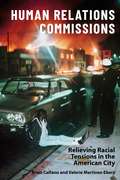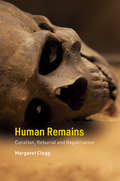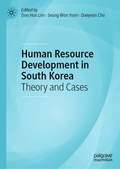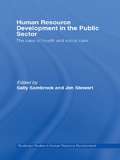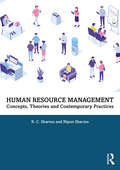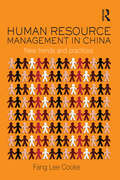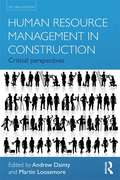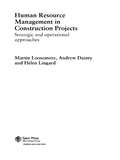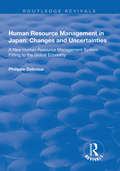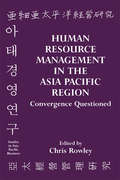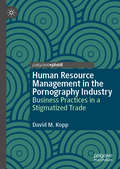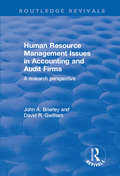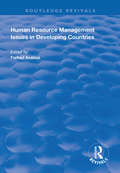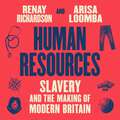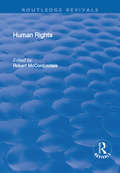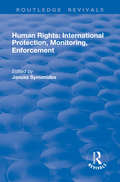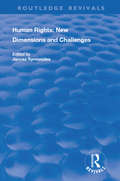- Table View
- List View
Human Population
by Richard P. Cincotta Larry J. GorenfloIn this volume the dynamic patterns of human density and distribution are examined in relation to the viability of native species and the integrity of their habitats. Social, biological, and earth scientists describe their models, outline their conclusions from field studies, and review the contributions of other scientists whose work is essential to this field. The book starts with general theories and broad empirical relationships that help explain dramatic changes in the patterns of the occurrence of species, changes that have developed in parallel with human population growth, migration and settlement. In the following chapters specific biomes and ecosystems are highlighted as the context for human interactions with other species. A discussion of the key themes and findings covered rounds out the volume. All in all, the work presents our species, Homo sapiens, as what we truly have been and will likely remain--an influential, and often the most influential, constituent in nearly every major ecosystem on Earth.
Human Predators And Prey Mortality
by Mary StinerDrawing from a wide variety of human societies and prey species, this book seeks to validate the importance of mortality studies for understanding modern and prehistoric human ecology. In a presentation that sets out to be both methodologically and theoretically innovative, the contributors combine archaeological and actualistic approaches with sea
Human Predicaments: And What to Do about Them
by John KekesIn his latest book, esteemed philosopher John Kekes draws on anthropology, history, and literature in order to help us cope with the common predicaments that plague us as we try to take control of our lives. In each chapter he offers fascinating new ways of thinking about a particular problem that is fundamental to how we live, such as facing difficult choices, uncontrollable contingencies, complex evaluations, the failures of justice, the miasma of boredom, and the inescapable hypocrisies of social life. Kekes considers how we might deal with these predicaments by comparing how others in different times and cultures have approached them. He examines what is good, bad, instructive, and dangerous in the sexually charged politics of the Shilluk, the Hindu caste system, Balinese role-morality, the religious passion of Cortes and Simone Weil, the fate of Colonel Hiromichi Yahara during and after the battle for Okinawa, the ritual human sacrifices of the Aztecs, and the tragedies to which innocence may lead. In doing so, he shakes us out of our deep-seated ways of thinking, enlarging our understanding of the possibilities available to us as we struggle with the problems that stand in the way of how we want to live. The result is a highly interesting journey through time and space that illuminates and helps us cope with some of the most basic predicaments we all face as human beings.
Human Prehistory: Exploring the Past to Understand the Future
by Deborah BarskyThis book provides a concise overview of human prehistory. It shows how an understanding of the distant past offers new perspectives on present-day challenges facing our species - and how we can build a sustainable future for all life on planet Earth. Deborah Barsky tells a fascinating story of the long-term evolution of human culture and provides up-to-date examples from the archaeological record to illustrate the different phases of human history. Barsky also presents a refreshing and original analysis about issues plaguing modern globalized society, such as racism, institutionalized religion, the digital revolution, human migrations, terrorism, and war. Written in an accessible and engaging style, Human Prehistory is aimed at an introductory-level audience. Students will acquire a comprehensive understanding of the interdisciplinary, scientific study of human prehistory, as well as the theoretical interpretations of human evolutionary processes that are used in contemporary archaeological practice. Definitions, tables, and illustrations accompany the text.
Human Programming: Brainwashing, Automatons, and American Unfreedom
by Scott SeliskerDo our ways of talking about contemporary terrorism have a history in the science, technology, and culture of the Cold War? Human Programming explores this history in a groundbreaking work that draws connections across decades and throughout American culture, high and low. Scott Selisker argues that literary, cinematic, and scientific representations of the programmed mind have long shaped conversations in U.S. political culture about freedom and unfreedom, and about democracy and its enemies. Selisker demonstrates how American conceptions of freedom and of humanity have changed in tandem with developments in science and technology, including media technology, cybernetics, behaviorist psychology, and sociology. Since World War II, propagandists, scientists, and creative artists have adapted visions of human programmability as they sought to imagine the psychological manipulation and institutional controls that could produce the inscrutable subjects of totalitarian states, cults, and terrorist cells. At the same time, writers across the political spectrum reimagined ideals of American freedom, democracy, and diversity by way of contrast with these posthuman specters of mental unfreedom. Images of such &“human automatons&” circulated in popular films, trials, travelogues, and the news media, giving form to the nebulous enemies of the postwar and contemporary United States: totalitarianism, communism, total institutions, cult extremism, and fundamentalist terrorism. Ranging from discussions of The Manchurian Candidate and cyberpunk science fiction to the cases of Patty Hearst and the &“American Taliban&” John Walker Lindh, Human Programming opens new ways of understanding the intertwined roles of literature, film, science, and technology in American culture.
Human Races
by Prof. Stanley M. GarnFirst published in 1961, this book provides a contemporary definition of race, the distinction between geographical, local and micro-races, as well as consideration of the major evolutionary mechanisms of race formation in man.Author Professor Stanley M. Garn was and remains a pivotal figure in the history of biological interpretations of race. He considered racial classification based on physical traits to be imprecise, and believed physical traits to be independent of each other, making classification by the assumption that a population shares certain traits incorrect. He also argued that racial classifications based on physical type seemingly elevated some physical traits to a racial status, but glossed over others, and concluded that racial classifications based on physical type can always be compartmentalized into smaller populations which share more physical traits in common.Thus, here in his book Human Races, he used three gradations of racial classification which were increasingly more specific in scope: geographical, local and micro.“Human Races is an attempt to describe what race is, and the mechanisms of racial differentiation in man. It will, I hope, help to dispel the antiquated notions of three “original” races, of the persistence of racial types, and of the role of undirected chance in bringing about racial differences. In their stead, I trust will emerge the contemporary picture of man’s genetic response to local selective factors, the constantly changing nature of the natural populations we call races.”—Author’s Preface
Human Relations: The Art and Science of Building Effective Relationships (Second Edition)
by Vivian McCannFor courses in Adjustment, Interpersonal Behavior, and Human Relations. A conceptual and skills-based overview of relationship building in today’s world. Human Relations: The Art and Science of Building Effective Relationships helps students learn how to communicate more effectively within all of their personal and professional relationships. Employing a three-tiered approach to human relations, author Vivian McCann helps students to understand the psychological concepts that underlie relationships, to build the skills needed to communicate effectively, and to consider the influence of cultural norms and backgrounds throughout the relationship-building process. Revised to reflect the latest data and research, the Second Edition also includes updated information about how new technologies have greatly impacted today’s relationships.
Human Relations And Law Enforcement
by Larry Miller Michael Braswell John WhiteheadLaw enforcement professionals encounter multiple challenges. The experiential case-study approach of Human Relations and Law Enforcement honed through seven editions places readers in hypothetical problem situations. Scenarios invite reflection and prompt a deeper understanding of the nature of law enforcement work. Concise but thorough introductions set the stage for thoughtful analysis of police-community relations, crisis intervention, interacting with juveniles, effective contact with the emotionally distressed, coping with stress, making ethical decisions, and administrative responsibilities. Case commentaries and questions stimulate discussion about possible courses of action and potential outcomes.
Human Relations Commissions: Relieving Racial Tensions in the American City
by Prof Valerie Martinez-Ebers Prof. Brian CalfanoDuring the 1950s, amid increased attention to the problems facing cities—such as racial disparities in housing, education, and economic conditions; tense community-police relations; and underrepresentation of minority groups—local governments developed an interest in “human relations.” In the wake of the shocking 1965 Watts uprising, a new authority was created: the Los Angeles City Human Relations Commission. Today, such commissions exist all over the United States, charged with addressing such tasks as fighting racial discrimination and improving fair housing access.Brian Calfano and Valerie Martinez-Ebers examine the history and current efforts of human relations commissions in promoting positive intergroup outcomes and enforcing antidiscrimination laws. Drawing on a wide range of theories and methods from political science, social psychology, and public administration, they assess policy approaches, successes, and failures in four cities. The book sheds light on the advantages and disadvantages of different commission types and considers the stresses and expectations placed on commission staff in carrying out difficult agendas in highly charged political contexts. Calfano and Martinez-Ebers suggest that the path to full inclusion is fraught with complications but that human rights commissions provide guidance as to how disparate groups can be brought together to forge a common purpose. The first book to examine these widely occurring yet understudied political bodies, Human Relations Commissions is relevant to a range of urban policy issues of interest to both academics and practitioners.
Human Remains: Curation, Reburial and Repatriation
by Margaret CleggWorking with human remains raises a whole host of ethical issues, from how the remains are used to how and where they are stored. Over recent years, attitudes towards repatriation and reburial have changed considerably and there are now laws in many countries to facilitate or compel the return of remains to claimant communities. Such changes have also brought about new ways of working with and caring for human remains, while enabling their ongoing use in research projects. This has often meant a reevaluation of working practices for both the curation of remains and in providing access to them. This volume will look at the issues and difficulties inherent in holding human remains with global origins, and how diverse institutions and countries have tackled these issues. Essential reading for advanced students in biological anthropology, museum studies, archaeology and anthropology, as well as museum curators, researchers and other professionals.
Human Resource Development in South Korea: Theory and Cases
by Doo Hun Lim Seung Won Yoon Daeyeon ChoThis edited book covers major trends, notable distinctions, and the challenges and needs for preparing future HRD activities in South Korea. It consists of three major sections: national and social issues of HRD, sector perspectives on HRD, and contemporary issues and trends. To cover contemporary trends and future issues, authors examine topics in diverse areas, such as the application of data analytics for HRD, action learning trends, and psychological and work climate issues affecting performance. Through theory and cases, this book will show how HRD can be successful at the organizational, industrial, and societal levels as well as the future needs required to further advance HRD in the nation.
Human Resource Development in the Public Sector: The Case of Health and Social Care (Routledge Studies in Human Resource Development)
by Jim Stewart Sally SambrookAcross Europe and the world, countries are attempting to develop their health and social policies and practices to address the global challenge of increasing demand and pressurized supply, created by ageing populations, emerging technologies and finite resources (financial and human). This text provides examples of attempts to develop HRD practices in health and social care contexts within France, Ireland, The Netherlands, Romania, Russia, the UK and the USA. Thus, the book is European and international in both scope and appeal.
Human Resource Management: Concepts, Theories, and Contemporary Practices
by R. C. Sharma Nipun SharmaThis textbook introduces readers to an array of concepts and current practices of human resource management (HRM). It provides an understanding of the current problems in the area that require pragmatic research and realistic solutions.Using a blend of diverse concepts, theories, tools and techniques, the book discusses contemporary practices of HRM and the challenges related to acquiring and training people, human resource development, compensation and reward, employee relations, technological changes, HR records, audit, research and more. Supported by the authors’ rich experience of over five decades in academics as well as in the corporate sector and case studies, the book will enhance conceptual understanding of HRM, throw light on recent developments in this subject area and offer management strategies for problems and challenges related to human resources.This book will be an essential textbook for students, professionals, corporate trainers and researchers of business studies, management studies, marketing, human resource management, resource management, work and organisational psychology, human resource development, risk management, economics and finance.
Human Resource Management in China: New Trends and Practices (Routledge Studies In The Growth Economies Of Asia Ser.)
by Fang Lee CookeThe approach to managing human resources has changed significantly in China over the last twenty-five years as its transformation from a state planned economy to a market-oriented economy continues. By adopting a broad notion of HRM, while remaining sympathetic to the strong emphasis on relationship management in the Chinese culture, Fang Lee Cooke builds on the foundations of traditional Chinese HRM practice and brings it right up to date, including analysis of currently under-explored issues such as diversity management, talent management, new pay schemes, and performance management. Including extensive first hand empirical data and pedagogical features such as vignettes, case studies, and further reading lists. This book will be of great use on upper level undergraduate, post graduate and MBA courses covering international/Chinese management and HRM as well as appealing to practitioners, students and scholars of Chinese Business, Asian Business and Human Resource Management.
Human Resource Management in Construction: Critical Perspectives
by Andrew Dainty Martin LoosemoreThe construction sector is one of the most complex and problematic arenas within which to manage people. As a result, the applicability of much mainstream human resource management (HRM) theory to this industry is limited. Indeed, the operational realities faced by construction organizations mean that all too often the needs of employees are subjugated by performance concerns. This has potentially dire consequences for those who work in the industry, for the firms that employ them and ultimately, for the prosperity and productivity of the industry as a whole. In this new edition of their leading text, Andrew Dainty and Martin Loosemore have assembled a collection of perspectives which critically examine key aspects of the HRM function in the context of contemporary construction organizations. Rather than simply update the previous edition, the aim of this second edition is to provide a more critical commentary on the ways in which the industry addresses the HRM function and how this affects those who work within the industry. To this end, the editors have gathered contributions from many of the leading thinkers within construction HRM to critique the perspectives presented in the first edition. Each contributor either tackles specific aspects of the HRM function, or provides a critical commentary on industry practice. The authors explain, using real-life case studies, the ways in which construction firms respond to the myriad pressures that they face through their HRM practices. Together the contributions encourage the reader to rethink the HRM function and its role in defining the employment relationship. This provides essential reading for students of construction and project management, and reflective practitioners who are interested in theoretically informed insights into industry practice and its implications. ?
Human Resource Management in Construction Projects: Strategic and Operational Approaches
by Martin Loosemore Andrew Dainty Helen LingardAlthough construction is one of the most labour-intensive industries, people management issues are given inadequate attention. Furthermore, the focus of attention with regards to HR has been on the strategic aspects of HRM function - yet most problems and operational issues arise on projects. To help redress these problems, this book takes a broad view of HRM, examining the strategic and operational aspects of managing people within the construction sector. The book is aimed at project managers and students of project management who, until now, have been handed the responsibility for human resource management without adequate knowledge or training. The issues addressed in this book are internationally relevant, and are of fundamental concern to both students and practitioners involved in the management of construction projects. The text draws on the authors' experience of working with a range of large construction companies in improving their HRM operational activities at both strategic and operational levels, and is well illustrated with case studies of projects and organizations.
Human Resource Management in Japan: Changes and Uncertainties - A New Human Resource Management System Fitting to the Global Economy (Routledge Revivals Ser.)
by Philippe DebrouxThis title was first published in 2003. Seeking to demonstrate a high level of insight, this is an analysis of the characteristics and advantages of Japanese human resource management. It describes the situation and the main trends in the transformation of the Japanese human resource management and employment practices, and investigates the possible options for the future. The work should be useful to academics and policy makers dealing with Japan and courses on human resource management and economics.
Human Resource Management in the Asia-Pacific Region: Convergence Revisited
by Chris RowleyHRM (human resource management) suffers from a selective tendancy and ad hoc approach, which misses the historical, paradoxical often incoherent, incompatible and inconsistent nature of the subject. This text reduces this myopia by adding to our knowledge and the milieu within which it operates.
Human Resource Management in the Pornography Industry: Business Practices in a Stigmatized Trade
by David M. KoppWhile pornography is stigmatized as “dirty work," it faces many of the same operational considerations as traditional industries. From increasing competition, new technology that impacts services, to health and workplace safety issues, the pornography industry also utilizes and applies HRM strategies that include recruiting, selecting and retaining the best (sex) workers. As a follow up to his last book on the social history of training and development (2018), Kopp writes this final installment of a system contained within an unconventional setting as he reflects and distills the facets of human resource management found in the pornography industry. Specifically, this book explores traditional human resource management processes and practices, and examines how common HRM systems are contextualized in an “organization-as-pariah” venue. Topics covered include recruiting, career development, performance management and workforce diversity, offering readers a value-neutral, analytical assessment of the HR practices in the unconventional industry and stigmatized trade that is pornography.
Human Resource Management Issues in Accounting and Auditing Firms: A Research Perspective (Routledge Revivals)
by John A Brierley David GwilliamThis title was first published in 2001: Focusing on human resource management practices in the multinational multi-service providers, this text presents some complex academic research in an accessible form. This book collates and reviews, in a manner designed to be both accessible and comprehensible to the interested reader, the extensive body of academic literature which has been developed since the 1980s. In addition, it provides a perspective on human resource management issues, practices and problems based in part on interviews with senior personnel. Most suitable for scholars and practitioners of business and management, social policy/sociology and economics.
Human Resource Management Issues in Developing Countries (Routledge Revivals)
by Farhad AnalouiPublished in 1998, this work brings together 17 individual papers written by academics, practioners and consultants who have dealt with human resource issues in various contexts and developing countries. It covers management, education and training and through these addresses ethnic and gender issues, financial markets in transition economies and agricultural development. Countries featuring in the studies include Bangladesh, Ghana, Pakistan, and Costa Rica - and the authors draw on their own experiences in these countries.
Human Resources: Slavery and the Making of Modern Britain – in 39 Institutions, People, Places and Things
by Renay Richardson Arisa LoombaOrdinary items take on new meanings when you cast them in different light. The origins of tea, coffee and sugar are well known, but when you discover that gym treadmills were pioneered on plantations or that denim jeans were once clothing for enslaved people, you can't help but ask where else the legacy of slavery hides in plain sight.Through the stories of thirty-nine everyday places and objects, Renay Richardson and Arisa Loomba unpick the threads of the history that we never learned in school, revealing the truth of how Britain's present is bound to a darker past.Taking us from art galleries to football stands, banks to hospitals, from grand country houses to the backs of our kitchen cupboards, Human Resources is an eye-opening inquiry that gives a voice to the enslaved people who built modern Britain.
Human Rights: Sovereignty, Human Rights And The Self-determination Of Peoples (Routledge Revivals Ser.)
by Robert McCorquodaleThis title was first published in 2003. Theories of human rights are important, as they can be a means to challenging entrenched and oppressive power. These key essays take a philosophical approach to human rights, questioning dominant theories and offering different perspectives on their application.
Human Rights: International Protection, Monitoring, Enforcement (Routledge Revivals Ser.)
by Janusz SymonidesThis title was first published in 2003. The series of volumes prepared by UNESCO for teaching human rights at higher education level comes to a conclusion with the publication of this volume. "Human Rights: International Protection, Monitoring, Enforcement" takes an institutional approach to the international protection of human rights, examining first the United Nations system, which may be seen as universal, and then analysing regional systems of protection. A useful source of information on the protection of human rights, the volume can also be employed as a practical guide to the use of existing procedures in the defence of human rights.
Human Rights: New Dimensions and Challenges (Routledge Revivals)
by Janusz SymonidesFirst published in 1998, this first volume of The Manual on Human Rights Education for Universities has been prepared in the hope that it will serve as a teaching aid for institutions of higher education, as well as for UNESCO Chairs, and focuses on new dimensions and challenges. UNESCO’s long experience in this field goes back to 1951, when the first guide for teachers on the Universal Declaration of Human Rights was published. This formed part of UNESCO’s efforts to create a comprehensive system of human rights education, embracing formal and non-formal education. Issues explored include peace, the environment, education, discrimination and extreme poverty.
